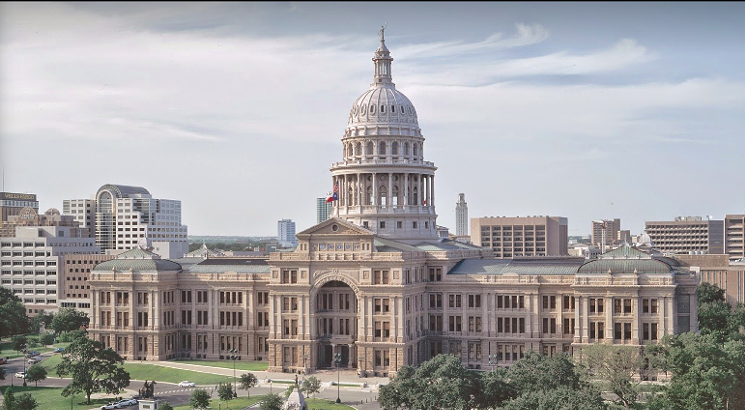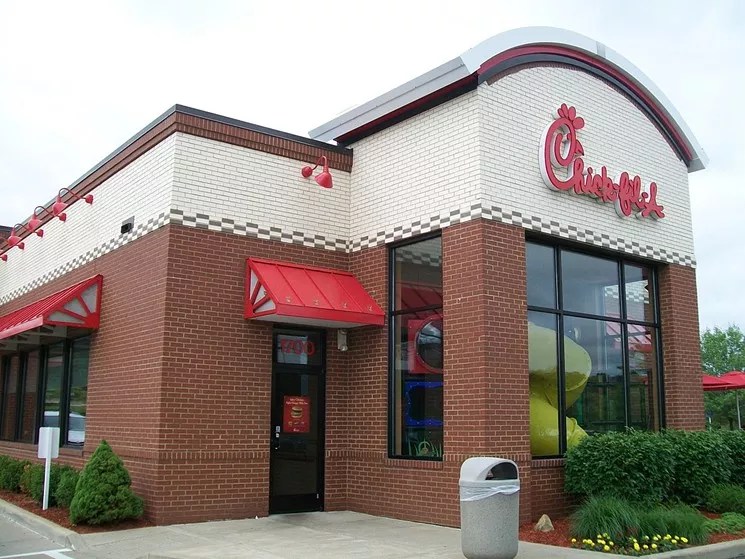
Wikicommons

Audio By Carbonatix
Just as quickly as it came onto the scene in January, the 86th Texas Legislature faded into the background Monday night, closing up shop for the next two years. With Texas Gov. Greg Abbott’s tweeted promise that he would not call a special session, Texans can rest easy knowing that their state House and Senate representatives won’t be back to do official business in Austin until 2021, when the 87th Legislature officially convenes.
As 140 days’ worth of smoke continues to clear, let’s take a look at the best, and worst, of the 2019 Texas Legislature.
The Best of the Lege
Texas leaders stand up for the state’s drivers – The legislature passed laws killing both red-light cameras and the universally loathed Driver Responsibility Program, which imposed so many surcharges on drivers busted for things like driving without a license that more than a million Texas drivers lost the legal ability to drive, according to numbers obtained by the Texas Tribune in 2018.
“This unfair license suspension scheme particularly targets Texas’ most impoverished residents, who are often unaware additional charges are owed under the DRP,” Phil Telfeyan, the lead attorney in a lawsuit seeking to end the program and executive director of Equal Justice Under Law, said in December. “Individuals who cannot pay will often lose their job and their home – becoming homeless – for a minor ticket that wealthier drivers simply pay and forget.”
As long as Abbott signs the bill ending the Driver Responsibility Program, all those drivers who’ve been off the road or driving illegally will have a chance to escape the scheme and renew their licenses. It’s hard to see that as anything but a good thing.
Dallas state Rep. Victoria Neave stands out again – Neave followed up a strong freshman term in the House by passing one of the most important bills of the 2019 session. The representative’s House Bill 8 would

State Rep. Victoria Neave attended the Dallas Mega March in April 2017.
Elroy Johnson
give the Texas Department of Public Safety $50 million to catalog and test all of Texas’ unexamined rape kits.
Medical cannabis slowly marches on – It’s a small victory, but Texas’ drug policy reform advocates will take what they can get. Thanks to a bill authored by Republican state Rep. Stephanie Klick, Texans suffering from conditions like multiple sclerosis, terminal cancer and ALS will now be eligible to participate in the state’s Compassionate Use Program, which allows those with certain medical problems access to CBD oil with .5% THC content.
Finally, finally, the Legislature does something to address the state’s school finance crisis – The 2019 Texas Legislature addressed a state crisis decades in the making with a comprehensive school finance reform package. As a result, the state will take on a higher percentage of Texas’ public school costs, in addition to funding raises for teachers and programs like full-day pre-K for low-income students.
Michael Hinojosa, superintendent of the Dallas Independent School District, told the Observer’s Silas Allen he was generally pleased with the plan.
He appreciates the flexibility the plan gives the district regarding teacher pay raises. The Senate’s previous plan would have given a $5,000 across-the-board pay raise to every teacher and librarian in the state. The plan lawmakers agreed on gives the district discretionary cash to give raises to employees as it sees fit – something that fits well with the district’s pay-for-performance plan, he said.

Dallas ISD Superintendent Michael Hinojosa speaks to Texas Gov. Greg Abbott in October.
Stephen Young
Hinojosa said he was also pleased to see funding for full-day pre-K included in the final plan. Currently, the state funds only half-day pre-K for qualifying students, but the district offers a full-day program for those students and picks up the tab for the difference in cost. The plan allows districts that already offer full-day pre-K to put the new money toward any part of their early learning programs. Hinojosa said he plans to bring a proposal to the Dallas school board’s June meeting to offer pre-K classes to students who don’t qualify but have significant need.
Full-day pre-K programs offer a big improvement over half-day programs, Hinojosa said. More classroom time means students can get deeper into learning, he said. Full-day programs also mean parents don’t have to worry about childcare for the half day their children aren’t in school.
Texas doesn’t pull a Georgia on abortion – Whether the decision was born out of fear of electoral backlash or fear of overreaching without a judicial net, Texas Republicans didn’t hop on the Georgia, Alabama and Missouri anti-abortion crazy train.
State Rep. Briscoe Cain’s “heartbeat bill,” which would’ve banned abortions occurring more than six weeks after conception, didn’t get a committee hearing in the House after being assigned to a committee headed by Democrat Senfronia Thompson. Arlington Republican Rep. Tony Tinderholt’s abortion bill, which would’ve completely banned and criminalized abortion in the state, got a committee hearing, but not a committee vote, and never stood a chance of passing.
The Worst of the Lege
Everyone’s a plumber – Thanks to the Legislature’s failure to pass a stopgap bill, the state’s plumbing code and Board of Plumbing Examiners went down the drain at the end of the session, meaning that anyone can call themselves a plumber without facing repercussions from the state. Unless the governor backtracks on his promise not to call a special session, be careful whom you call to check on your pipes for the next couple of years.
Women’s health theater – While Texas’ pro-life legislators seemingly can’t help saying they are merely “looking out for women’s health” when they pass the state’s latest abortion restriction, the state House and Senate missed several easy opportunities to actually improve women’s health outcomes this spring.
House Bill 744, written by Dallas Democratic state Rep. Toni Rose, would’ve made sure low-income mothers had health insurance via Medicaid for 12 months after giving birth. It passed the House but didn’t get a vote in the Senate. Proposals to accept federal funds to expand Medicaid to all eligible Texans didn’t get a hearing in either chamber.
One women’s health bill that did pass, Senate Bill 22, will actually hurt women in the state. It bans local governments from partnering with organizations that provide abortion – think Planned Parenthood – even for programs that have nothing to do with abortion. As a result, a Planned Parenthood clinic located on city land in Austin that’s provided healthcare for decades is going to have to shut down.
“Many communities have long-standing agreements with nonprofits that would be nullified if this bill goes into law,” the American College of Obstetricians and Gynecologists said in announcing its opposition to the bill. “Many of the clinics, hospitals and providers that would be affected by this legislation serve low-income women and women in rural or isolated communities. Prohibiting these kinds of agreements will result in less women served, which in turn causes a negative fiscal impact on the state.”
No state income tax. Ever. – Thanks to the Legislature, the dozens of Texas voters who show up for the state’s constitutional amendment election in November will be able to amend the Texas Constitution to ban any future state income tax. At some point, Texans might be willing to trade a small state tax for lower property taxes or better state services. Barring an upset in November – given a choice between taxes or no taxes, voters will choose no taxes – future Texas residents won’t get that chance.

Observer files
Saving Chick-fil-A – While it didn’t waste its time on anything as useless as 2017’s cause célèbre, the Bathroom Bill, the 86th did spend way too much time discussing the so-called Chick-fil-A bill, which protects individuals from “adverse action” from local governments due to their religious associations – you know, just like the First Amendment.
It’s unclear how many teeth the bill will actually have, but the state’s saving Chick-fil-A, which was barred from opening a San Antonio airport outlet by the city’s City Council this spring, came at the expense of its reputation with the LGBTQ community.